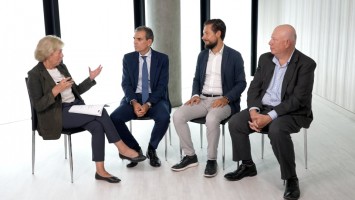HCC, hepatocellular carcinoma, is a very important health problem in Egypt. It is the most common cancer in Egypt after the epidemics of hepatitis virus C. We have about 43,000 patients every year. We may expect that this percentage declines after the vaccination strategy that now is already done in the country. Compared to the other countries we have maybe one of the highest instances of HCC worldwide.
Also it is very important now to go for maybe possible curative intent for treatment of HCC. Now the main curative intent is the liver transplant, liver transplant and radiofrequency ablation and also some of the resection, which should be maybe considered as a very, very limited number of patients. So the combination of treatments and the addition of systemic treatment is very important and considered an unmet need to have this systemic treatment.
We have only one treatment for about ten years which is sorafenib and all the other treatments compared to sorafenib were a great failure for ten years. Until the last two years we have a plethora of treatments that we have new treatment options and also the rationale of combination with other treatment modalities the local treatment with sorafenib. Considering the local treatment and the combination with sorafenib and the immunotherapy is a very, very new area and may help in the outcome of these patients.
The first positive clinical trial that showed positive results in combination treatment is the TACTIC study which has sorafenib with the local treatment with TACE and they have improvement in the progression free survival and the overall response rate. Then at last year’s conference they have another star trial showing also improvement in progression free survival and overall response rate. So the combination now is considered and added to to improve the outcome of the patient with advanced disease.
The other option, the systemic treatment, in the metastatic phase we have the first line, the second line. In the first line after sorafenib we have a new treatment which is lenvatinib and we are awaiting the results of the nivolumab trial with results in the first line treatment.
In the second line there is a lot of new treatment coming, including lenvatinib, including regorafenib in the patients who failed on the sorafenib, not those patients who have intolerance to sorafenib. Also cabozantinib also in the [xxx] alpha trial who have improvement in the progression free survival and overall survival in the second line setting.
The sequence is very important and also it is maybe discussed in our consensus session in this meeting either to start with sorafenib and then go for lenvatinib or to go for lenvatinib and then go to sorafenib. Also one of the most important issues is that shall we go for choosing the treatment type according to the response rate in patients who want to go for symptomatic relief or improvement in some area that may be the portal vein invasion or something. So there is a limiting factor and factors that may tailor the treatment, including the portal vein thrombosis, including the alpha-fetoprotein elevation more or less than 400 so we cannot use ramucirumab in the patients who have alpha-fetoprotein less than 400. So there are some limiting factors to choose or to tailor the second line treatment in HCC.
The future of treatment of HCC is based on basically the multidisciplinary approach and also the improvement in research activity and looking deeply to the cells and targetable areas that we can go for new drugs in this area. And also the addition of immunotherapy and the combination between immunotherapy and targeted therapy is the new era in the treatment of HCC.








